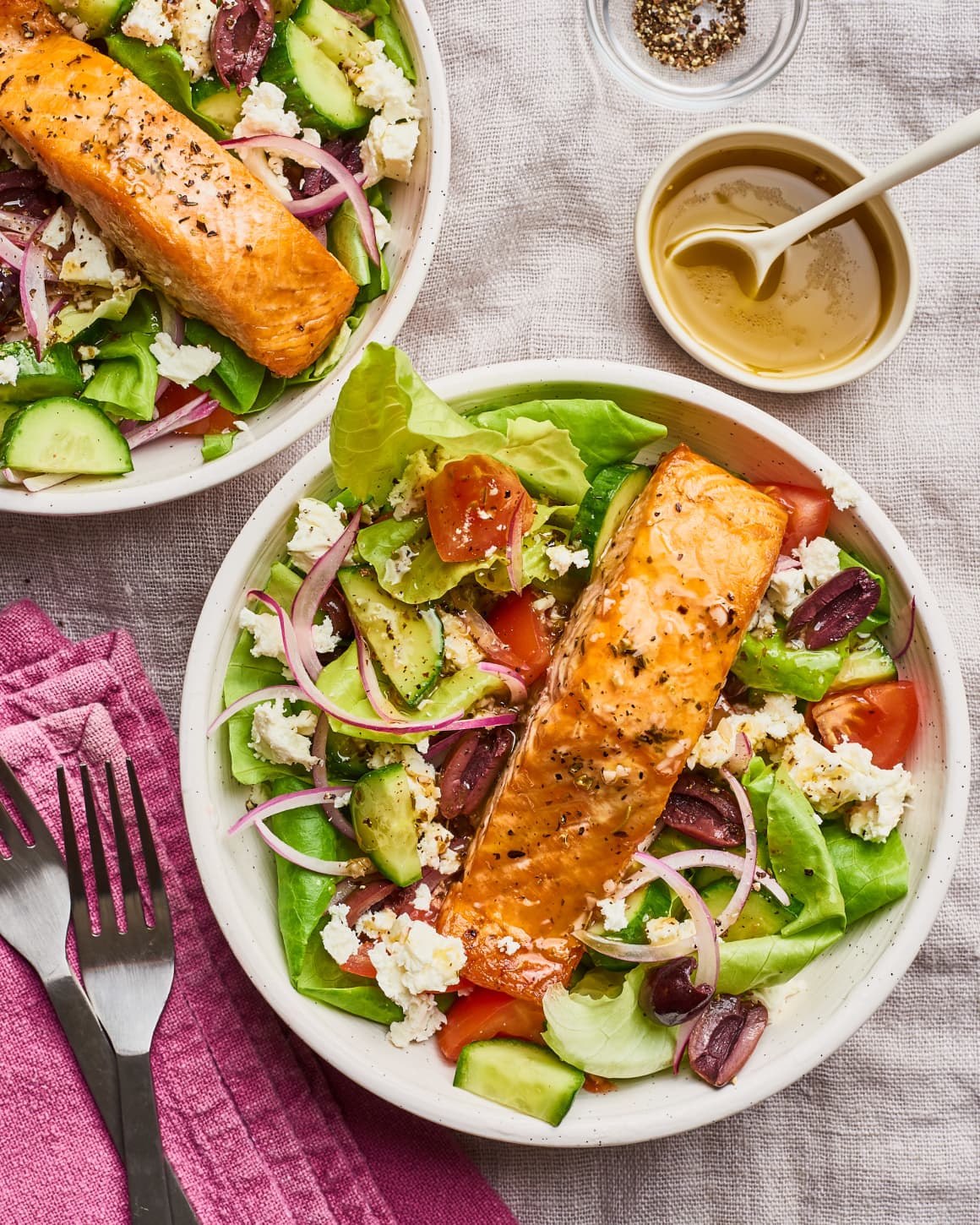
Why People Love This Way of Eating
By Stephanie, April 27, 2019 11:00 AM

At a time when more restrictive diets like keto and Whole30 are de rigueur, it’s both surprising and heartening to learn that the “best” diet out there is one that doesn’t put any food off-limits. In its 2019 ranking of 41 popular diets, U.S. News ranked the Mediterranean Diet as the best diet overall, as well as the best diabetes diet, best heart-healthy diet, best diet for healthy eating, best plant-based diet, and (perhaps most exciting of all) easiest diet to follow
Unlike fad diets and 30-day programs, the Mediterranean diet is a series of dietary guidelines and principles meant to help make healthy choices easier in the long term. It’s based on the typical food patterns of countries bordering the Mediterranean Sea in the 1960s, when life expectancy was among the highest in the world in these countries, and rates of diet-related chronic diseases were among the lowest.
1. What Can You Eat On A Mediterranean Diet?

The Mediterranean diet isn’t strictly defined. Instead of rules, there’s a food pyramid meant to guide healthy eating choices.
At the base of the Mediterranean diet pyramid are whole, unprocessed plant foods: whole grains, fruits, vegetables, beans, nuts, and unsaturated fats like those found in olive oil and avocado. These whole foods make up the bulk of what you eat on the diet. There’s no need to cook every single meal from scratch, but the diet encourages reducing refined grains and other processed foods.
In addition to prioritizing plant foods, the Mediterranean diet suggests
eating fish or seafood at least twice a week, as these are the best sources of heart- and brain-healthy omega-3 fatty acids. If you absolutely hate seafood, don’t rule out the diet just yet — chia seeds, flaxseeds, walnuts, and soybeans are all good sources of omega-3s, and fit into the Mediterranean diet framework.
Dairy, lean poultry, and eggs make up another level of the diet pyramid, along with the loose guideline to eat these animal products in “moderate portions daily to weekly.” In other words, chicken sandwiches and cheese-filled omelets are fine to eat on the Mediterranean diet, but shouldn’t be what you eat the majority of the time.
Red meat, sweets, and processed foods make up the tip of the pyramid, and are the things you should eat least often. They’re not off the table (nothing is!), but they’re “sometimes” foods that you don’t eat every day on the Mediterranean diet.
2. The Mediterranean Diet Is Also A Lifestyle

Lifestyle guidelines might seem a bit out of the scope here, but the Mediterranean diet encourages getting a healthy amount of activity — that’s two-and-a-half hours of moderate-intensity activity per week for adults, according to the Center for Disease Control (CDC). As with the food guidelines, there aren’t prescriptive recommendations for what this exercise should be, although there is an emphasis on finding activities you actually enjoy.
In a similar vein, taking pleasure in food and enjoying meals with others is central to the Mediterranean diet philosophy. And it’s fine to enjoy a glass of red wine while you eat, as long as that’s OK with your doctor (up to one glass per day for women and two glasses per day for men, according to the CDC).
3. What Are The Health Benefits?

You may have noticed that the Mediterranean diet has a lot in common with the USDA’s dietary guidelines. Whole plant foods, lean proteins, and healthy fats are emphasized; saturated fats, added sugars, and processed foods are minimized. So, it shouldn’t be a surprise that following the diet is great for your overall health.
A 2018 study of 25,994 women in the United States found that close adherence to the Mediterranean diet could reduce the risk of heart disease up to 28 percent, citing healthier BMI and blood sugar levels and lower levels of inflammations as the biggest contributors to this reduced risk. Likewise, a 2016 study of 23,902 men and women in Britain found that closely following the diet led to a significantly reduced risk of heart disease.
The diet also has proven benefits for diabetes prevention and management. In a 2014 review of nine studies on a total of 122,000 adults in Spain, researchers concluded that Mediterranean diet adherence is associated with a 19 percent reduced risk of Type 2 diabetes. And a 2015 study of 1,178 adults with Type 2 diabetes found that a Mediterranean diet led to improved blood sugar control, BMI, cholesterol, and blood pressure.
5. Doesn't Restrict Calories

The Mediterranean diet doesn’t restrict calories, and does emphasize healthy fats like olive oil and avocado, which are good for health but are also calorie-dense. While it’s possible to lose weight on a Mediterranean diet, the “calories in, calories out” rule still applies here. If you’re trying to lose weight on a Mediterranean diet, high-fiber fruits, vegetables, and whole grains should make up a larger part of your overall food intake, along with fish and lean protein sources.
Healthy fats from olive oil, avocado, nuts, and seeds are still great choices, but you may have to cut back on these higher-calorie foods if weight loss is your goal.
6. Bottom line: The Mediterranean Diet is a great choice because, well, its not really a diet

Instead of thinking of the diet and food pyramid as rules to live by, consider them a blueprint for a healthy, sustainable eating pattern.
Want To Learn More About The Mediterranean Diet?
© {2019} The Mediterranean Eats. All rights Reserved | Privacy Policy | Disclaimer